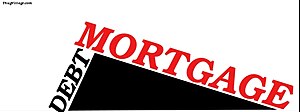This is a guest post from Marc Chase of My Credit Group.
Dealing with a lot of unpaid debt can be a hassle on its own. Having to pay those debts when you don’t even have a job to provide you with the money to do so can be a nightmare. While you’re hunting for a job to help make ends meet, your debts continue to pile up, leaving you scrambling to find a way to take care of them before they cause you to slip further into the poor house, and leave your finances needing credit repair services.
Since you’re likely more concerned about finding a job than anything else, we put together this handy checklist of what you should do to avoid your unpaid bills and debts getting the best of you while you search for a new job.
• Apply for unemployment benefits. This should be your first order of business after you’ve lost your job, especially if you’re one of the many Americans currently living paycheck to paycheck. Unemployment benefits go a long way towards helping consumers stay on top of their bills and credit accounts. Don’t make the mistake of thinking another job is just around the corner – there’s a good chance you can’t afford to wait.
• Keep paying the minimum balance. If you’re on the verge of drowning completely in unpaid debt, you may be tempted to stop paying your bills completely, at least until you get some additional funds in your account. Do this, and you’ll find yourself in need of credit score repair before you even get that call back for a follow-up interview.
Instead, do everything you can to at least pay the minimum balance on all of your credit accounts and bills. This will ensure that your credit history doesn’t take too much of a beating, and saves you from paying even more in interest fees down the line.
• Stop spending money like you have it. Because the sad truth is, while you’re still unemployed, you likely don’t have a lot of money to spare. If you’re still living your life as though you can afford to pay for everything – eating lunch and/or dinner out more than twice a week, generally buying things you don’t NEED – now’s the time to stop.
Stop charging every purchase you make to your credit card – break them out only in an emergency. This will help keep you from sinking further into debt while you’re out looking for a way to pay for your purchases.
• Eliminate and prioritize your bills. Now’s a great time to take a long look at some of the bills you’re paying, and deciding if they’re even worth the service. That doesn’t mean you should stop paying bills you consider “less important” than others; it means looking at some of the things that might have once been necessities (a land phone line if you primarily use a cell phone, a full package TV cable bill, etc.) and re-evaluating your stance on how important they are now that you can’t afford them all. In many cases, you can get in contact with your service provider(s) and talk about ways to reduce your bill (say, cancel cable but keep internet).
This is a guest post from Marc Chase, President of Product Development for My Credit Group, a website dedicated to helping consumers with managing their credit.









